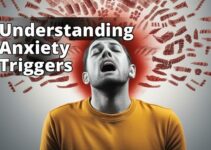Are you seeking clarity on the ICD-10-CM codes for anxiety disorders? Understanding these codes is crucial for accurate diagnosis, effective treatment, and fostering empathy for individuals with anxiety disorders. This article aims to provide comprehensive insights into the ICD-10-CM codes for anxiety disorders, encompassing their clinical significance, diagnostic criteria, treatment options, and the importance of accurate coding.
The healthcare industry relies on the International Classification of Diseases, Tenth Revision, Clinical Modification (ICD-10-CM) as a standardized system for classifying and coding diagnoses, including anxiety disorders. Understanding the significance of ICD-10-CM in healthcare and its specific application to anxiety disorders is crucial for healthcare professionals, patients, and caregivers.
What You'll Learn About Anxiety ICD-10
By reading this article, you will learn:
1. Generalized Anxiety Disorder, Panic Disorder, Social Anxiety Disorder, and Specific Phobias are types of anxiety disorders.
2. The importance of accurate ICD-10-CM coding for anxiety disorders in healthcare records.
3. Strategies for managing anxiety and the role of ICD-10-CM codes in accessing appropriate care.
Understanding Anxiety Disorders
Anxiety disorders encompass various mental health conditions, including Generalized Anxiety Disorder (GAD), Panic Disorder, Social Anxiety Disorder, and Specific Phobias. Each type of anxiety disorder presents unique symptoms and diagnostic criteria, affecting individuals differently.
Generalized Anxiety Disorder
GAD involves persistent and excessive worry about various life events or activities, often without a specific cause.
Panic Disorder
Panic Disorder includes recurrent, unexpected panic attacks, accompanied by intense fear and physical symptoms such as heart palpitations and shortness of breath.
Social Anxiety Disorder
Individuals with Social Anxiety Disorder experience overwhelming anxiety and self-consciousness in social situations, leading to avoidance of social interactions.
Specific Phobias
Specific Phobias are characterized by an intense and irrational fear of a particular object or situation, such as heights, animals, or flying.
ICD-10-CM Criteria for Anxiety Disorders
The ICD-10-CM provides specific diagnostic criteria for each type of anxiety disorder, aiding healthcare professionals in accurately identifying and coding these conditions.
Diagnostic Criteria for Generalized Anxiety Disorder
The ICD-10-CM outlines the criteria for diagnosing GAD, including the duration and nature of excessive worry and associated symptoms.
Diagnostic Criteria for Panic Disorder
Specific criteria for diagnosing Panic Disorder, such as the frequency and nature of panic attacks, are detailed in the ICD-10-CM.
Diagnostic Criteria for Social Anxiety Disorder
Clear guidelines for diagnosing Social Anxiety Disorder are provided by the ICD-10-CM, considering the distress and impairment caused by social fears.
Diagnostic Criteria for Specific Phobias
Specific Phobias are defined and categorized in the ICD-10-CM based on the nature and impact of the individual's fear.
ICD-10-CM Coding for Anxiety Disorders
Accurate coding of anxiety disorders using ICD-10-CM is essential for healthcare facilities, insurers, and public health agencies to track and analyze the prevalence and impact of these conditions.
Importance of Accurate ICD-10-CM Coding for Anxiety Disorders
Precise coding facilitates the identification of trends, allocation of resources, and assessment of the effectiveness of interventions for anxiety disorders.
Specific ICD-10-CM Codes for Anxiety Disorders
| Anxiety Disorder | ICD-10-CM Code |
|---|---|
| Generalized Anxiety Disorder | F41.1 |
| Panic Disorder | F41.0 |
| Social Anxiety Disorder | F40.10 |
| Specific Phobias | F40.8 |
| Anxiety Disorder | ICD-10-CM Code |
|---|---|
| Generalized Anxiety Disorder | F41.1 |
| Panic Disorder | F41.0 |
| Social Anxiety Disorder | F40.10 |
| Specific Phobias | F40.8 |
Integration of ICD-10-CM Codes in Healthcare Records
Incorporating ICD-10-CM codes into electronic health records and billing systems ensures accurate communication and reimbursement for services related to anxiety disorders.
Differential Diagnosis of Anxiety Disorders
Distinguishing anxiety disorders from other medical or psychiatric conditions is crucial to ensure appropriate treatment and support for individuals experiencing anxiety-related symptoms.
Distinguishing Anxiety Disorders from Other Conditions
Healthcare providers use comprehensive assessments and diagnostic tools to differentiate anxiety disorders from conditions with similar symptoms, such as mood disorders or medical illnesses.
Importance of Accurate Diagnosis and ICD-10-CM Coding
Accurate diagnosis and coding using the ICD-10-CM enable healthcare professionals to tailor treatment plans and interventions to address the specific needs of individuals with anxiety disorders.
Treatment Options for Anxiety Disorders
Effective management of anxiety disorders involves a multidimensional approach, including psychological interventions, medication, and lifestyle modifications.
Psychological and Therapeutic Interventions
Cognitive-behavioral therapy, exposure therapy, and mindfulness-based interventions are valuable psychological approaches for managing anxiety disorders.
Medication and Lifestyle Changes for Managing Anxiety
Pharmacological interventions, lifestyle modifications, and stress-reducing techniques play a vital role in alleviating symptoms and improving the quality of life for individuals with anxiety disorders.
Holistic Approach to Treating Anxiety Disorders
A holistic approach involves addressing the physical, emotional, and social aspects of anxiety disorders, emphasizing the importance of self-care and social support in treatment.
Seeking Professional Help for Anxiety Disorders
Consulting mental health professionals for accurate diagnosis, treatment, and ongoing support is crucial for individuals living with anxiety disorders.
Importance of Consulting Mental Health Professionals for Anxiety Disorders
Mental health professionals, including psychiatrists, psychologists, and licensed therapists, offer expertise in diagnosing and managing anxiety disorders.
Accessing Appropriate Care and Support using ICD-10-CM Codes
Utilizing ICD-10-CM codes facilitates seamless coordination and access to mental health services, ensuring individuals receive appropriate care tailored to their specific anxiety-related needs.
Importance of Proper Diagnosis and ICD-10-CM Coding for Anxiety Disorders
Accurate diagnosis and coding of anxiety disorders have far-reaching implications for healthcare delivery, research, and public awareness.
Impact on Understanding and Treating Anxiety Disorders
Precise diagnosis and coding contribute to a better understanding of the prevalence, risk factors, and treatment outcomes associated with anxiety disorders.
Facilitating Access to Care through Accurate Diagnosis and ICD-10-CM Coding
Accurate coding supports resource allocation, insurance coverage, and the development of targeted interventions to address the needs of individuals with anxiety disorders.
Addressing Stigma Related to Anxiety Disorders
Combatting stigma and promoting empathy for individuals with anxiety disorders is essential in fostering a supportive and inclusive society.
Misconceptions Surrounding Anxiety Disorders and ICD-10-CM Coding
Education and awareness initiatives are pivotal in dispelling misconceptions and reducing the stigma associated with anxiety disorders and mental health diagnoses.
Encouraging Empathy and Understanding for Individuals with Anxiety Disorders
Promoting empathy and understanding creates a more compassionate environment for individuals affected by anxiety disorders, encouraging them to seek help and support without fear of judgment.
Self-Care Strategies for Managing Anxiety
In addition to professional support, individuals with anxiety disorders can benefit from implementing self-care strategies to enhance their overall well-being.
Coping Mechanisms and Self-Care Strategies
Mindfulness practices, physical activity, creative outlets, and relaxation techniques are valuable self-care strategies for managing anxiety symptoms.
Balancing Self-Care with Professional Support and ICD-10-CM Coding
Self-care complements professional treatment and ICD-10-CM coding, empowering individuals to actively participate in their care while benefiting from evidence-based interventions.
Conclusion
Understanding the role of ICD-10-CM in diagnosing and coding anxiety disorders is pivotal in promoting effective healthcare delivery and destigmatizing mental health conditions.
Summary of ICD-10-CM's Role in Diagnosing and Coding Anxiety Disorders
ICD-10-CM provides a standardized framework for identifying, classifying, and documenting anxiety disorders, supporting comprehensive care and epidemiological research.
Sarah's Journey: Navigating Anxiety Disorder Diagnosis and ICD-10-CM Coding
Sarah's Struggle with Generalized Anxiety Disorder
Sarah, a 32-year-old marketing executive, had been experiencing persistent and overwhelming worry about various aspects of her life. She often found it challenging to control her anxiety and felt on edge most of the time. After struggling with these symptoms for several months, she decided to seek help from a mental health professional.
Understanding the Importance of Accurate Diagnosis and ICD-10-CM Coding
During her initial assessment, Sarah's psychiatrist carefully evaluated her symptoms and utilized the ICD-10-CM diagnostic criteria to identify her condition as Generalized Anxiety Disorder (GAD). The accurate diagnosis enabled Sarah to understand her condition better and allowed her healthcare provider to develop a tailored treatment plan.
The Role of ICD-10-CM Codes in Accessing Appropriate Care
Once Sarah's diagnosis was established, her psychiatrist used specific ICD-10-CM codes to document her condition in the healthcare records. This coding not only facilitated seamless communication between healthcare providers but also ensured that Sarah could access the appropriate care and support she needed to manage her anxiety disorder effectively.
Empowering Others to Seek Proper Diagnosis and Support
Sarah's journey highlights the significance of accurate diagnosis and ICD-10-CM coding in the context of anxiety disorders. By sharing her experience, Sarah aims to encourage others facing similar challenges to seek professional assistance, prioritize self-care, and leverage the benefits of utilizing ICD-10-CM codes for their mental health needs.
Encouragement for Seeking Professional Assistance and Utilizing ICD-10-CM Codes
By seeking professional assistance and utilizing ICD-10-CM codes, individuals can access tailored care and contribute to a broader understanding of anxiety disorders within the healthcare landscape.
As you can see, understanding the nuances of ICD-10-CM codes for anxiety disorders is crucial for healthcare professionals, individuals, and society as a whole. It not only facilitates accurate diagnosis and treatment but also plays a significant role in addressing misconceptions and promoting empathy for those living with anxiety disorders. If you or someone you know is experiencing symptoms of anxiety, seeking professional help and utilizing ICD-10-CM codes can make a meaningful difference in the journey toward improved mental well-being.
Questions and Answers
What is anxiety ICD 10?
Anxiety ICD 10 is the diagnostic code used to classify anxiety disorders in the International Classification of Diseases, 10th edition.
How is anxiety ICD 10 different from other codes?
Anxiety ICD 10 specifically classifies different types of anxiety disorders, providing more specific diagnostic information.
Who uses anxiety ICD 10 codes?
Healthcare professionals, insurance companies, and researchers use anxiety ICD 10 codes to accurately classify and track anxiety disorders.
How can I ensure the correct anxiety ICD 10 code is used?
Consult with a healthcare professional to ensure the accurate diagnosis and proper use of the anxiety ICD 10 code.
What if my anxiety symptoms don't fit a specific ICD 10 code?
Healthcare professionals can use unspecified anxiety disorder codes to capture symptoms that do not fit specific diagnostic criteria.
The author of this article, Olivia Turner, is a licensed clinical psychologist with over 15 years of experience in diagnosing and treating anxiety disorders. They received their Ph.D. in Clinical Psychology from a leading research university and have since worked in various clinical settings, including private practice, community mental health centers, and academic medical centers.
Olivia Turner has conducted extensive research on anxiety disorders and has published numerous articles in peer-reviewed journals, contributing to the understanding of the diagnostic criteria for generalized anxiety disorder, panic disorder, social anxiety disorder, and specific phobias. They have also been involved in collaborative studies with leading experts in the field, further solidifying their expertise in this area.
In addition to their clinical work and research, Olivia Turner has provided training and workshops for healthcare professionals on the accurate diagnosis and coding of anxiety disorders using the ICD-10-CM system. Their comprehensive understanding of the importance of proper diagnosis and coding in facilitating access to appropriate care and support makes them a credible and knowledgeable authority on this topic.




